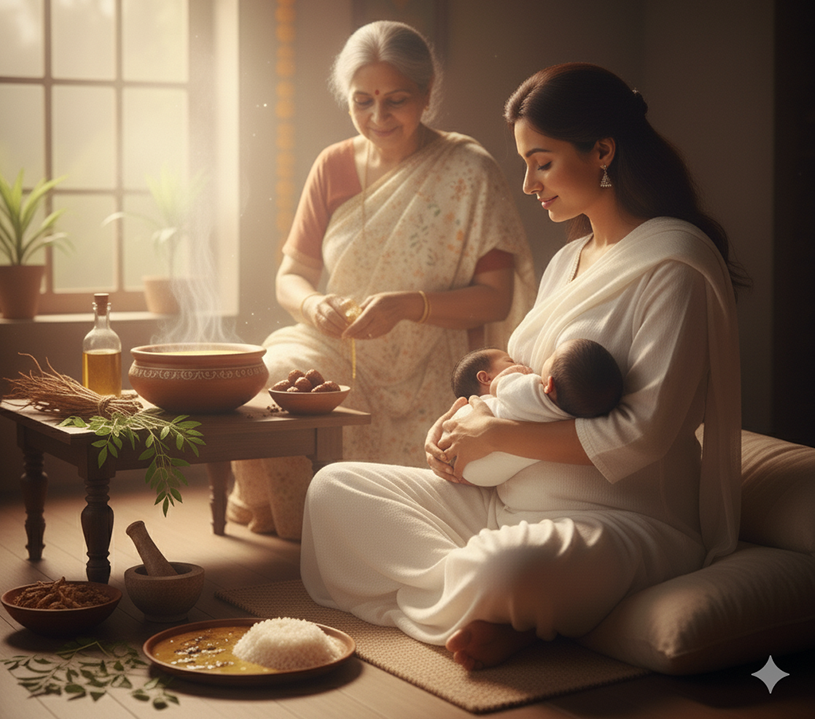Pregnancy Through the Lens of Ayurveda and Ancient Scriptures
By Dr. Anjali Menon

As I write this forward, the debate in the United States about the safety of Tylenol use during pregnancy is making national headlines, with both President Trump and Robert F. Kennedy Jr. weighing in. At such a moment, Dr. Anjali Menon’s article comes to us as a very timely reminder that pregnancy is not only a medical condition but also a sacred journey—one that Ayurveda has honored for thousands of years.
Ayurveda views the mother as a vessel of divine energy, where her food, thoughts, and emotions all directly shape the growing child. The article beautifully explains how our ancient texts—Charaka Saṃhitā and Suśruta Saṃhitā—offered practical guidance on diet, lifestyle, and mental peace during each stage of pregnancy. It highlights how small, mindful changes can nurture both mother and child with balance and harmony.
At the same time, Dr. Menon is very clear—and we at Desh-Videsh wholeheartedly reiterate—that Ayurveda is not a substitute for conventional medical treatment. This article is meant to offer cultural and spiritual insights, not medical prescriptions. Pregnant women must always consult their medical doctor if they experience fever, pain, or any abnormality throughout pregnancy.
For Indian-American families raising the next generation here in the U.S., this wisdom is especially valuable. It allows us to stay rooted in our heritage while embracing the best of modern science. In doing so, we create a bridge—where timeless traditions meet contemporary care—to give our children not only health, but also a legacy of values, balance, and spiritual strength.
May every mother’s journey be filled with peace, strength, and divine joy.
Raj Shah
Managing Editor
Ayurveda regards pregnancy as a sacred period where the woman becomes a vessel of divya shakti (divine energy). The classics emphasize not only the nourishment of the body but also the cultivation of a peaceful, sattvic environment for the developing child.
Charaka Saṃhitā (Śārīrasthāna 8.32) describes pregnancy as a delicate state:
“Garbhini tu atisūkṣmā syāt”
(A pregnant woman is extremely delicate and must be cared for with the greatest caution.)
This underscores that special attention must be given to her diet, routine, and mental state, as they directly influence the fetus.
What Are the Three Stages of Pregnancy in Ayurveda?
 First Trimester (0–12 Weeks, Kapha Dominant)
First Trimester (0–12 Weeks, Kapha Dominant)
The predominance of Kapha during early pregnancy brings heaviness and nausea. Ayurveda prescribes light, warm, and easily digestible foods to balance Kapha.
Charaka Saṃhitā (Śārīrasthāna 8.4) states:
“Yathā śarīrasya saṃskāraḥ tathā garbhasya”
(Just as the body of the mother is nourished, so is the fetus nourished.)
Thus, simple food like warm milk, ginger, and light soups are recommended.
Second Trimester (13–28 Weeks, Pitta Dominant)
During this stage, Pitta rises, bringing heat, heartburn, and skin changes. Cooling foods and meditation are recommended.
Suśruta Saṃhitā (Śārīrasthāna 10.48) highlights the importance of balance:
“Madhura-snigdha-śītaṃ bhojyaṃ garbhiṇyāḥ śreyaskaram”
(Sweet, unctuous, and cooling foods are most beneficial for the pregnant woman.)
Cucumber, coconut water, and ghee-enriched meals pacify Pitta and support the child’s development.
Third Trimester (29–40 Weeks, Vata Dominant)
As delivery approaches, Vata becomes dominant, leading to anxiety, dryness, and restlessness.
Charaka Saṃhitā (Śārīrasthāna 8.31) prescribes:
“Snigdha-madhura-āhāra sevanaṃ garbhiṇyāḥ”
(The pregnant woman should consume unctuous and sweet foods to pacify Vata.)
Warm, nourishing meals with milk, rice, dates, and ghee prepare the body for labor. Meditation and gentle yoga calm the mind and reduce fear.
What Supplements and Herbs Are Recommended?
 Ayurvedic texts suggest herbs with caution, always under expert guidance.
Ayurvedic texts suggest herbs with caution, always under expert guidance.
- Shatavari: Known as the “queen of herbs” for women, supports fertility and lactation.
- Ginger: Mentioned in Bhavaprakasha Nighantu as useful for nausea.
Charaka Saṃhitā (Chikitsa 30.123) recommends:
“Śatāvarī prayoktavyā garbhiṇīnām hita-īpsitā”
(Shatavari should be used for pregnant women as it promotes health and well-being.)
What Lifestyle Changes Should Women Make During Pregnancy?
Ayurveda emphasizes dinacharya (daily routine), sattvic āhāra (pure diet), and manasika shanti (mental peace).
Suśruta Saṃhitā (Śārīrasthāna 10.53) states:
“Yad yad garbhiṇī paśyati śṛṇoti bhāṣate spṛśati bhuṅkte ca, tad tad garbhasya bhavati”
(Whatever a pregnant woman sees, hears, speaks, touches, and eats, all these influence the fetus.)
Thus, uplifting thoughts, music, mantras, and nourishing foods are essential.
What Insights Can Ayurveda Offer for a Healthy Pregnancy?
Ayurveda insists that emotional harmony is as important as diet. The mother’s moods shape the unborn child.
Charaka Saṃhitā (Śārīrasthāna 8.25) reminds:
“Garbhiṇyāḥ prasannātmā bhavitavyam”
(The pregnant woman should remain calm, content, and joyous.)
Bonding with the child through mantra chanting and storytelling is encouraged.
Ayurvedic View on Fever During Pregnancy
1. General Fever (Mild to Moderate)
- Causes (Doṣic basis): Often linked to pitta aggravation (excess heat, inflammation) or ama (undigested toxins).
- Risks: Excessive heat or dehydration can harm fetal development, so cooling, nourishing, and safe measures are prioritized.
Charaka Saṃhitā (Śārīrasthāna 8.31):
“Garbhiṇī sūkṣma sattvā, hita-ahita sevanaṃ bhavati garbhasya api”
(The pregnant woman is delicate, and whatever is beneficial or harmful to her affects the fetus as well.)
Recommendations:
- Light, easily digestible, cooling foods: rice gruel (yavāgu), barley water, moong dal soup.
- Herbal teas: coriander seed water, fennel water, or cumin-coriander-fennel decoction.
- Rest in a cool, calm environment.
- Gentle oil massage (abhyanga) with coconut oil on the forehead and soles of the feet to reduce body heat.
2. High Fever (Severe, Burning, or with Chills)
- Considered dangerous in Ayurveda since it can disturb pitta and vata, leading to complications like dehydration, miscarriage risk, or fetal distress.
- Suśruta Saṃhitā (Śārīrasthāna 10.48):
“Ati-uṣṇaṃ jvaram garbhiṇyāḥ pratyākhyeyaṃ”
(Severe fever in pregnancy must never be neglected.)
 Supportive Ayurvedic Measures (always under physician’s guidance):
Supportive Ayurvedic Measures (always under physician’s guidance):
- Shadanga Paniya (a decoction of musta, parpataka, usheera, chandana, udichya, and nagara) – classical for pitta-jvara (fever with burning sensation, thirst).
- Guduchi (Tinospora cordifolia) decoction – widely recommended for fever, immunity, and safe in pregnancy when used properly.
- Amalaki (Indian gooseberry) – cooling and rejuvenating, balances pitta, supports immunity.
- Coconut water – hydrating, cooling, and sattvic.
- Peya (thin rice gruel) – maintains nutrition without taxing digestion.
Important Safety Note
- High fever in pregnancy is a medical emergency. Ayurveda emphasizes mṛdu cikitsā (gentle treatment), but also advises not to delay modern medical care.
- Charaka Saṃhitā (Chikitsa Sthāna 30.289):
“Jvare garbhiṇyāḥ laghu-auṣadhi sevanaṃ kartavyam”
(In fever, the pregnant woman should be treated only with light and gentle medicines.)
So, if fever is above 101°F (38.3°C), or accompanied by chills, severe weakness, abdominal pain, or decreased fetal movement, immediate consultation with a modern OBGYN is essential. Ayurveda would be applied as supportive care, not as a replacement.
Practical Guidance:
- For mild fever → rest, hydration, rice gruel, coriander/fennel teas, cooling environment.
- For high fever → immediate medical care + supportive Ayurvedic remedies like Guduchi and Shadanga Paniya under physician supervision.
- Avoid strong purgatives, emetics, or heavy detox therapies (contraindicated in pregnancy).
What Should Couples Do Before Pregnancy?
Ayurveda gives great importance to Garbhadhana Saṃskāra—the preparatory rituals and practices before conception.
Charaka Saṃhitā (Śārīrasthāna 2.14):
“Śuddhāyāḥ śarīrasya garbhasya śuddhir bhavati”
(When the body is purified, the conception also becomes pure and healthy.)
Panchakarma (detoxification), sattvic diet, yoga, and herbs like Ashwagandha and Shatavari are suggested to prepare for conception.
What Is the Ayurvedic Approach to Post-Pregnancy Care?
The post-partum stage (Sutika Kāla) is considered as delicate as pregnancy itself. The mother’s health determines her recovery and the baby’s nourishment.
Suśruta Saṃhitā (Śārīrasthāna 10.57) prescribes:
“Snigdha-āhāra sevanaṃ sutikāyāḥ hitaṃ smṛtam”
(Oily, nourishing foods are best for the woman after delivery.)
Charaka Saṃhitā (Śārīrasthāna 8.52) adds:
“Tailābhyangaḥ snānaṃ ca sutikāyāḥ hitāḥ smṛtāḥ”
(Oil massage followed by bathing is beneficial for the postnatal mother.)
Thus, ghee, soups, fenugreek, Shatavari, Ashwagandha, and warm oil massages restore vitality.
The wisdom of Charaka and Suśruta makes it clear that pregnancy is not only biological but also spiritual. From Garbhadhana (conception) to Sutika (postpartum care), Ayurveda provides a holistic path where food, lifestyle, emotions, and environment together nurture both mother and child.
Ayurveda Quick-Reference Chart: Fever in Pregnancy
| Category | Recommendations (Safe in Mild Fever) | Avoid |
| Foods to Take | – Light rice gruel (yavāgu)
– Moong dal soup – Barley water – Warm vegetable broth – Coconut water – Stewed apples or pears |
– Heavy, oily, fried foods
– Spicy, sour, or very salty dishes – Fermented foods – Leftovers or refrigerated meals – Very cold drinks or ice creams |
| Safe Herbs (under Ayurvedic supervision) | – Guduchi (Tinospora cordifolia): reduces fever, supports immunity
– Coriander seed tea: cooling, helps digestion – Fennel tea: relieves burning sensation – Amalaki (Amla): cooling, rich in Vitamin C – Shadanga Paniya (classical decoction for fever, safe when mild) |
– Strong purgatives or emetics
– Detoxifying herbs like strong Triphala, castor oil, or harsh laxatives – Rasayana formulations without physician advice |
| Lifestyle Measures | – Rest in a calm, cool environment
– Gentle forehead/crown massage with coconut oil – Stay hydrated with warm water or herbal teas – Wear loose cotton clothes |
– Overexertion
– Exposure to direct heat/sun – Stress or emotional agitation |
| 🚨 Emergency Signs – Seek Medical Help Immediately | – Fever above 101°F (38.3°C)
– Severe chills, dehydration, or fainting – Intense abdominal pain or cramping – Vaginal bleeding or fluid leakage – Reduced fetal movement – Persistent vomiting or inability to keep fluids down |
Do not delay contacting your OBGYN or visiting a hospital if these occur. |
About the Author:
 Dr. Anjali Menon
Dr. Anjali Menon
BAMS, MS, PGDYT
I was born in Kochi, Kerala, where Ayurveda is a way of life, and this tradition inspired my path as an Ayurveda physician. My journey began in 2007 with a BAMS degree from Amrita School of Ayurveda, Kollam, followed by a Master’s in Ayurveda from Gujarat Ayurveda University, Jamnagar. Along the way, I received training in yoga therapy, skin and beauty care, and pulse diagnosis.
My education shaped not only my clinical and diagnostic skills but also my ability to blend logical reasoning with holistic healing. The guidance of my teachers went far beyond textbooks, offering both practical wisdom and spiritual insights.
Later, I served as an Assistant Professor at KLE Ayurveda Medical College, Belgaum, where I had the privilege of mentoring students and enhancing my own academic and clinical expertise.

















